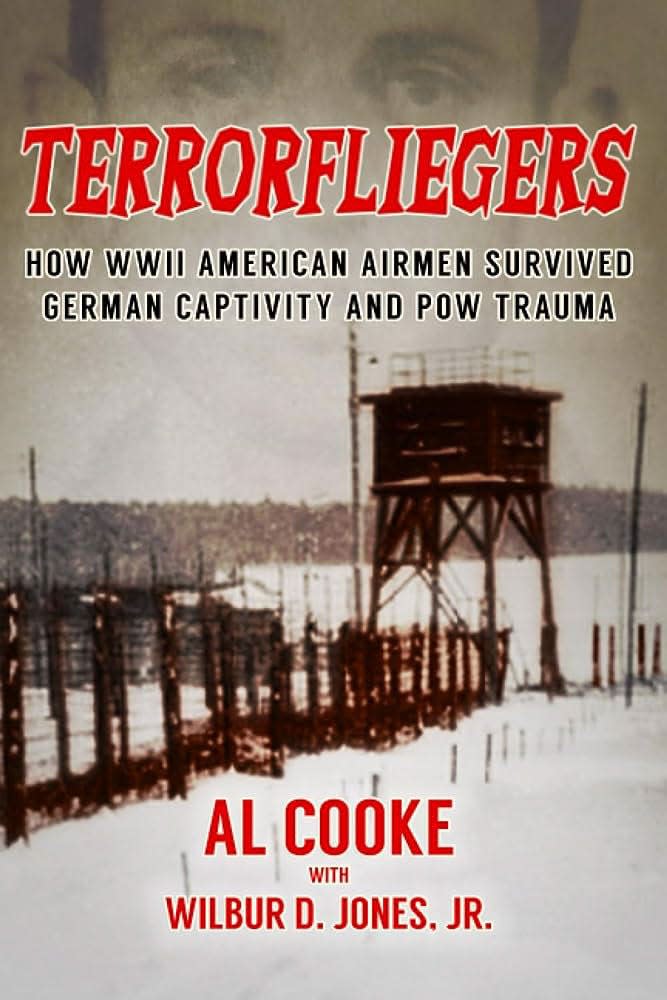New book recounts how a Wilmington man survived life in Nazi prison camp during WWII

Many Baby Boomers had their visions of World War II molded, or warped, by "Hogan's Heroes." The long-running CBS comedy series made life in a German prisoner-of-war camp look like a romp, rather like summer camp or a frat house, as the clever POWs outwitted the Germans every week.
Reality was very different, as Al Cooke documents in his book "Terrorfliegers: How WWII American Airmen Survived German Captivity and POW Trauma."
Cooke, a graduate of New Hanover High School and a longtime farm extension agent, bases his account on the experiences of his father, Roland Cooke, a technical sergeant with the U.S. Air Force. Shot down over Germany in February 1944, the elder Cooke would spend close to 15 months in a succession of German Luft Stalags, prison camps run by the Luftwaffe, the Nazi air force.
Using family letters, a few recollections, histories and period news accounts, the son reconstructed his father's story. Wilmington World War II historian Wilbur D. Jones Jr. ("A Sentimental Journey") helped Al Cooke put his account together and wrote the book's preface.
So, what did "Hogan's Heroes" leave out?
First, the cold. The Germans seized many of the captured airmen's flight suits, leaving them lightly clothed in a northern European winter. Wooden POW barracks were poorly insulated and often lacked stoves. Many POWs were billeted in tents. Temperatures remained in the 40s and 50s even in the summer on the Baltic coast.
Second, the hunger. Meals were normally bread and potatoes, with a little cabbage. There might be a hint of meat in the stew on Sunday. Red Cross packages, when they arrived, sometimes contained life-saving dried fruit or canned fruit, but there was never enough.
Third, the brutality. There were very few "Sergeant Schultz" types, affable guards who could be bribed with cigarettes. Others were Nazi sadists. Cooke and his comrades remembered a 6-foot-6 guard nicknamed "Big Stoop" who waited for an excuse to pummel GIs. He seized cans from those precious Red Cross packages and sometimes punctured the cans he didn't take.
In transit, Cooke was poked with bayonets, hard enough to break the skin, when he didn't move as fast as his captors liked. One comrade of Cooke's was permanently crippled by a rifle butt striking his spine.
Almost as bad as the guards were the hostile German civilians, who resented the toll of the Allied bombers. They called the captured airmen "Terrorfliegers" or "terrorist fliers."
Then, there was the boredom. Sometimes there were books. Cooke later said he learned more history and geography as a POW then he did in school. Walking laps around and around the camp, the POWs all but invented Trivial Pursuit, quizzing each other on state capitals, college mascots and any other topics they could think of. Food was the favorite topic of conversation, imagining their first, or second or third meal back in the States.
Raised on a North Carolina tenant farm, with no phone, no running water and no indoor toilets, Roland Cooke had stamina and survived to come home. Still he paid a price. The term "post-traumatic stress" hadn't been coined in the 1940s, but it's clear it affected the Greatest Generation. Al Cooke thinks PTSD might have accounted for his father's chronic ulcers, which led to the removal of much of his stomach.
Book reviews Nostalgia for camp rules the day in NC author's romance novel 'The Summer of Songbirds'
Roland Cooke moved to Wilmington in 1954, where he became a foreman at Carolina Power & Light's Sutton Steam Plant, worked with civic clubs and coached Little League baseball. He died in 1998.
"Terrorfliegers" is a fine example of how a family history can illuminate and illustrate the lives of many others. Roland Cooke was a hero, but he was not the only one.
Book review
'Terrorfliegers: How WWII American Airmen Survived German Captivity and POW Trauma'
By Al Cooke, with Wilbur D. Jones Jr.
Wrightsville Beach: Simply Francis Publishing, $19.99 paperback
This article originally appeared on Wilmington StarNews: New book "Terrorfliegers" by Al Cooke, with Wilbur D. Jones Jr.

